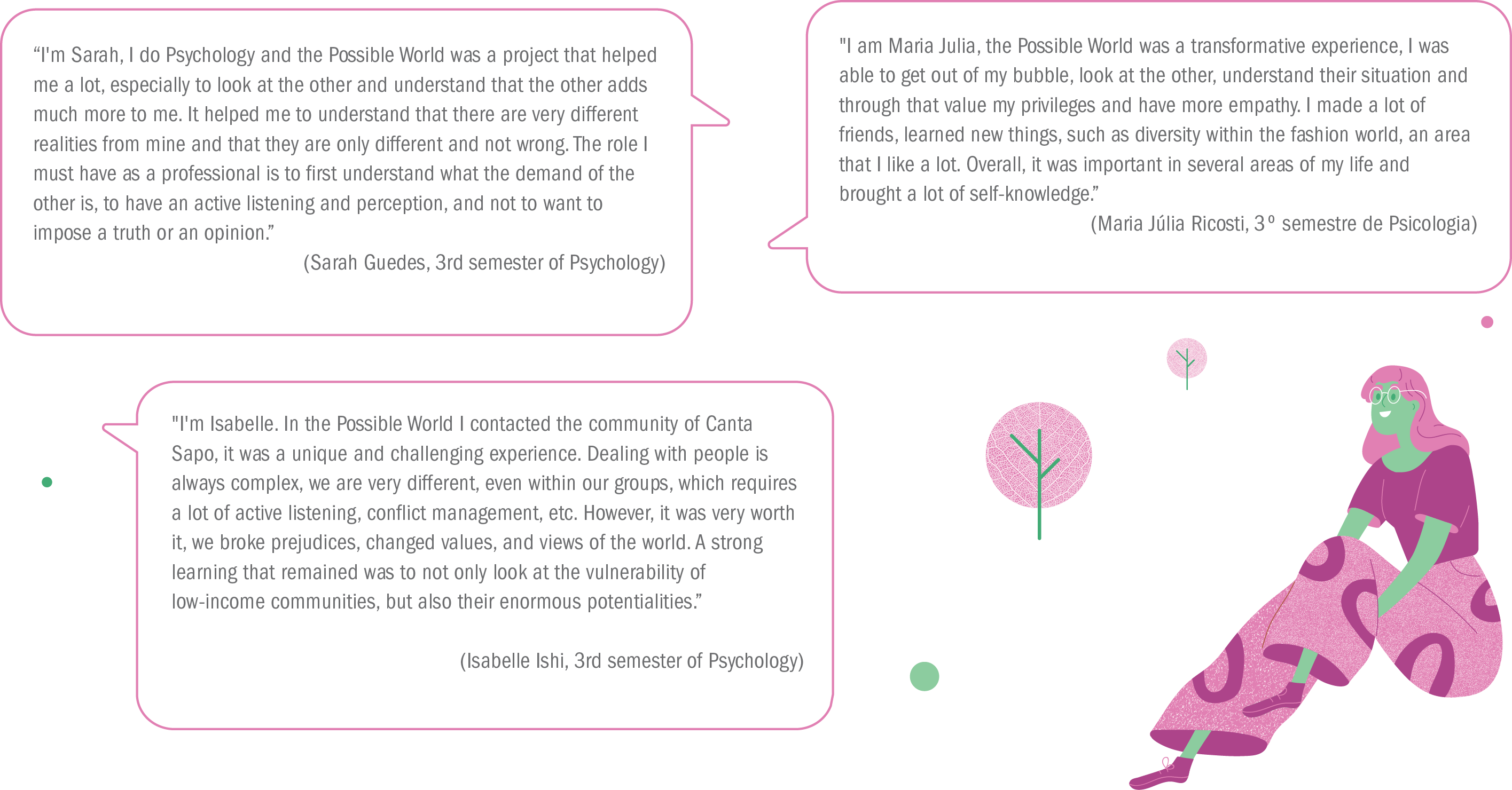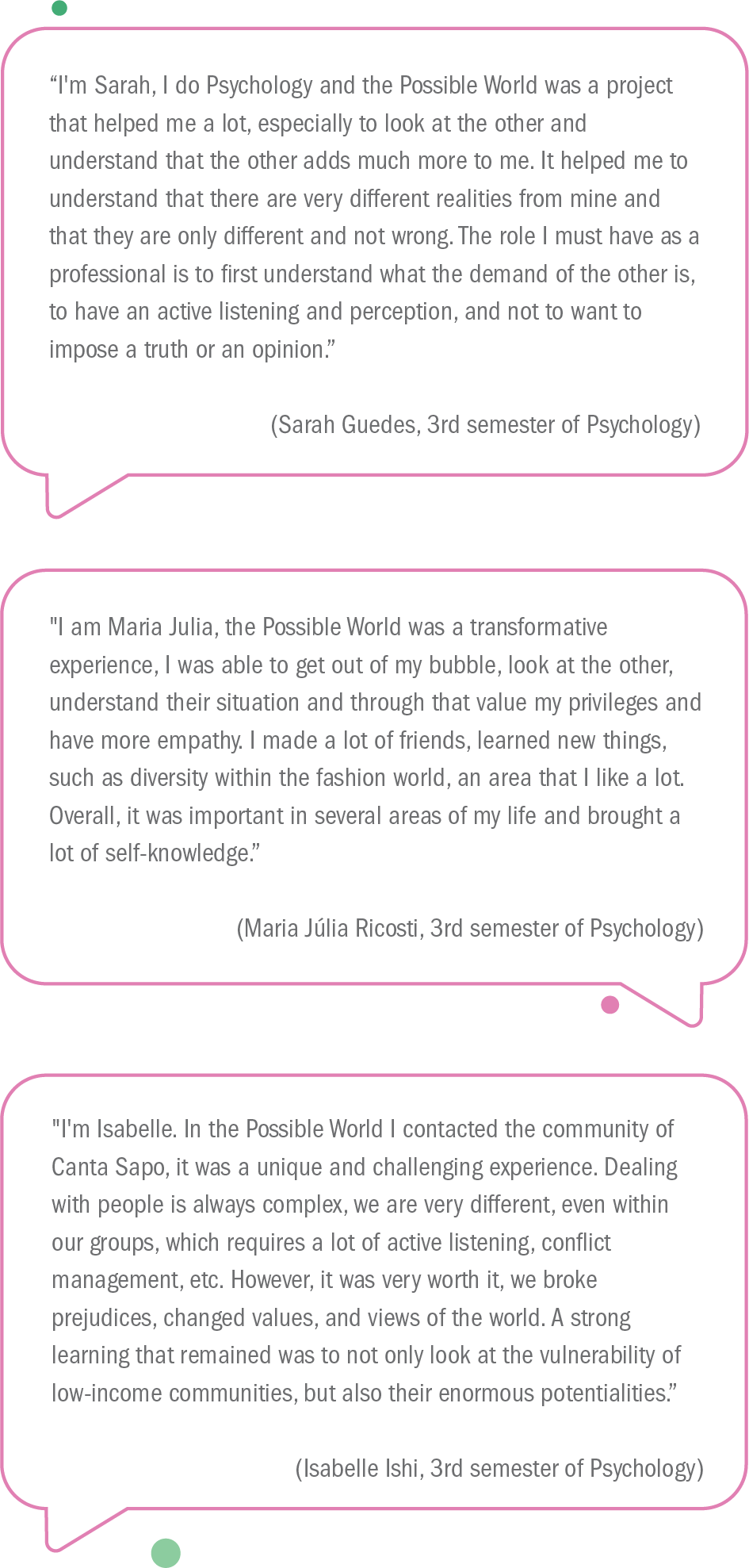2022 Sustainability Report / Quality education
ODS relacionado:
Quality Education
The educational model of the Facens University Center places the student as a protagonist in the learning process, uniting theory, and practice from real challenges of the market, society, and planet.
Development is integral, encompassing technical and behavioral skills, which stimulates self-knowledge, proactivity, and entrepreneurship.
“Without education forsustainability, we will not be able to build a more just and equitable societyfor all.”
David Orr
Experimental Projects Plant (UPX)
The Experimental Projects Plant (UPX) is a module that makes up the curriculum of undergraduate courses and promotes the development of technical and socio-emotional skills, as well as the expansion of socio-environmental awareness and entrepreneurial attitude. Moreover, it presents local and global challenges and how they relate to the market. UPX's activities are always aligned with the Sustainable Development Goals and the Sustainable Projects Guide.
The goal of this curricular module, and differential of our teaching, is to develop in the student a systemic, multidisciplinary vision and integration with the entire ecosystem of Smart Campus® Facens. Each semester of the Engineering and Technology courses has a macro theme addressed at UPX, namely:

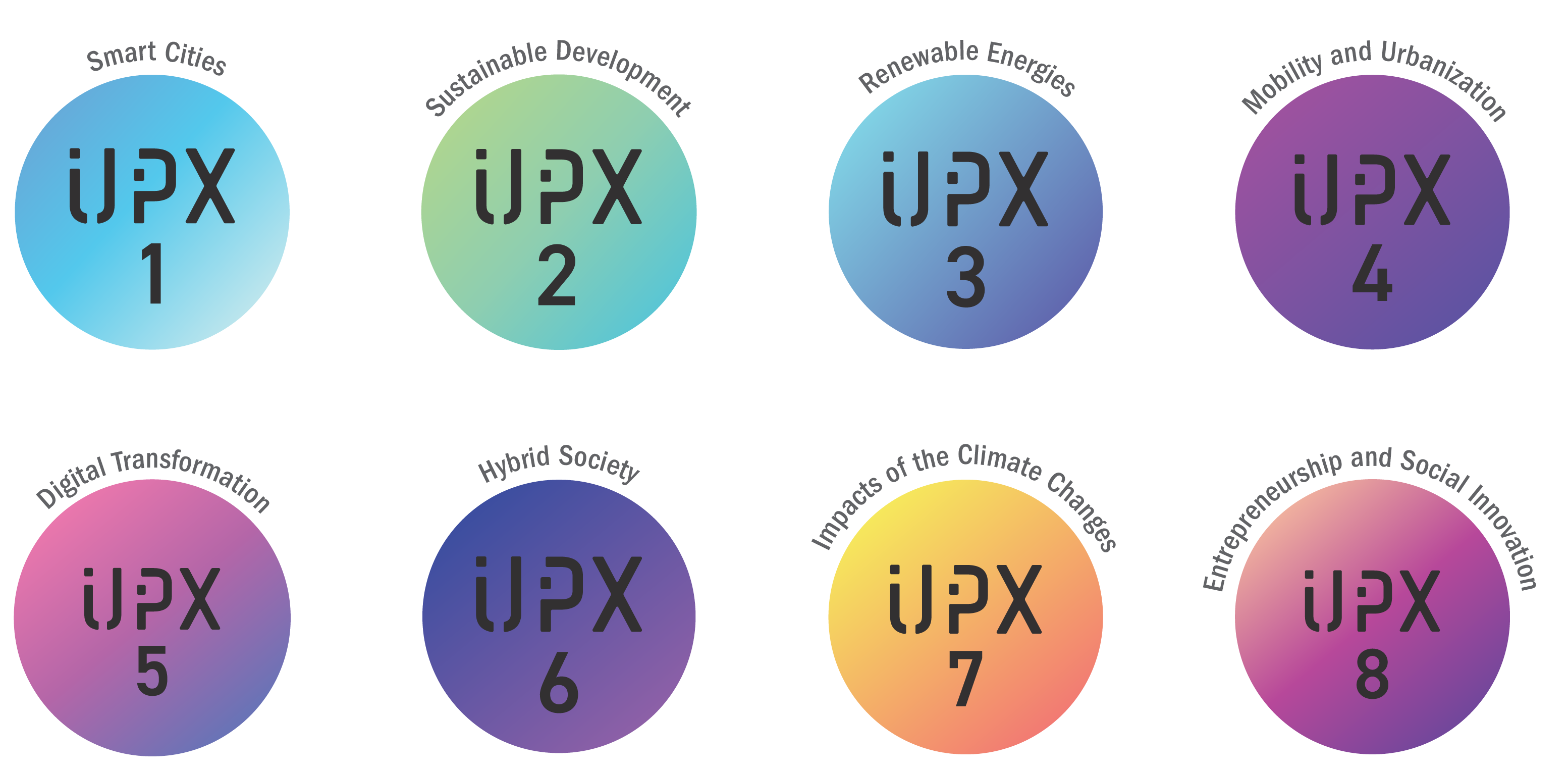
Postgraduation
At Facens, in 2022, we offered 24 postgraduate courses, where all students could benefit from the structure and opportunities provided by Facens. Among them, we highlight the MBA in Management and Innovation in Smart Cities, which offers a solid foundation in management and knowledge about trends and innovations that can be applied to conglomerates and cities, making them smarter, more humane, and sustainable. It covers a holistic view of the main national and international cases, as well as best practices in: energy, health and quality of life, industry, education, urban mobility, transportation, security and cybersecurity, information and communication technology, social innovation, environment, architecture and urban planning, and new business models.
Conheça mais dos nossos cursos de pós-graduação


Mundos Possíveis
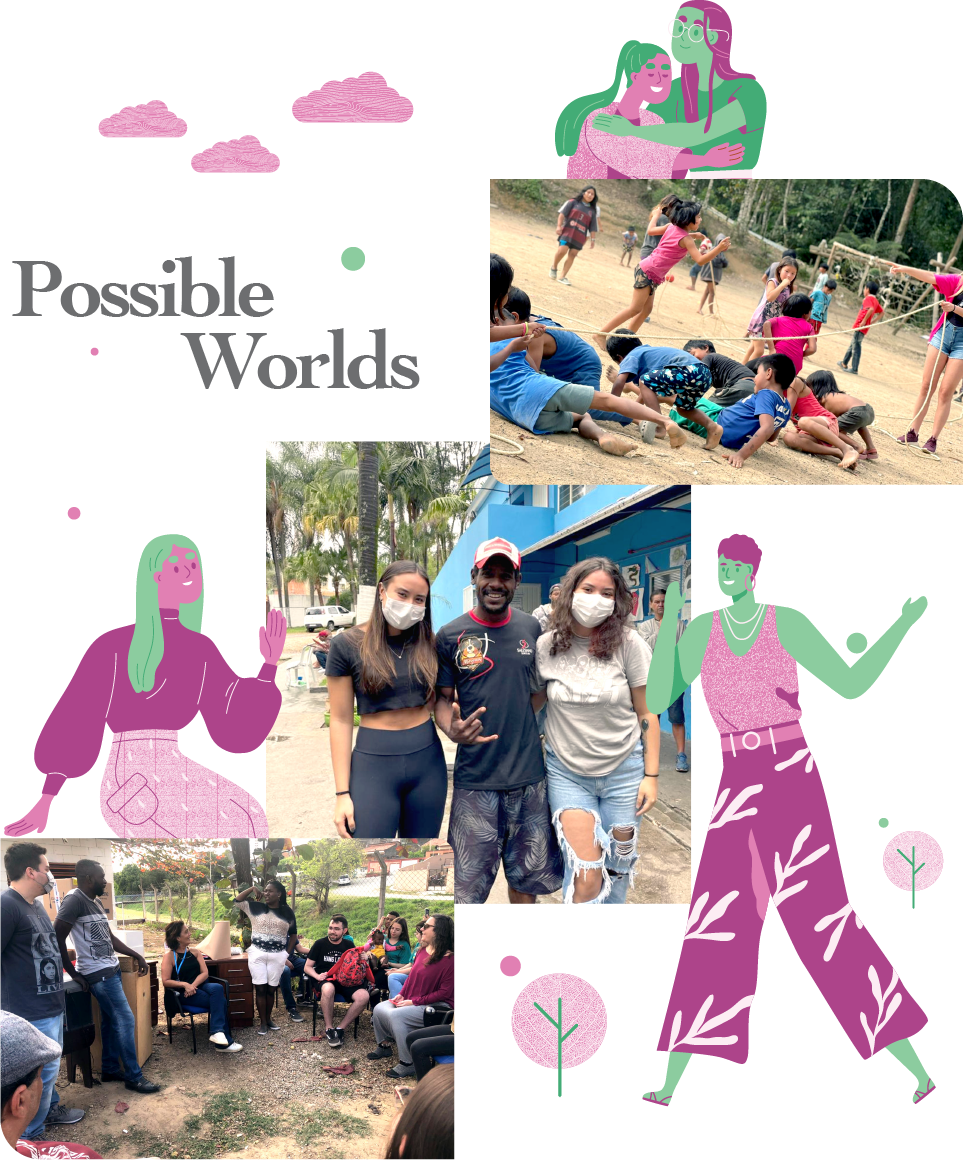
The project "Possible Worlds – Where Looks Cross" was organized by Enlace with the students of the Social and Community Psychology subject, of the 2nd semester of the Psychology course, and aimed to bring knowledge and welcoming to different communities through individual, and collective actions.
Generally, individuals in these communities are unaware of their rights and duties compared to privileged groups in society. They end up being excluded and unable to access social spaces and formal jobs, resulting in an isolation that makes them invisible. Thus, future psychologists came on the scene to provide shelter and make visible a trajectory of possibilities that can be built with the resources that these people have.
The students interacted with people from different communities in a state of vulnerability and, during the actions, they were able to learn about other worldviews, get to know life stories and, through dynamics of exchanges with empathy, they were able to overcome stigmas and get rid of prejudices. This whole process was conducive to the discovery of potential that can contribute to the reduction of vulnerabilities.
In total, 86 students participated in the project, forming research groups, and community experience and, for three months, exercised social and community psychology, transforming themselves with their discoveries throughout this experience.
People from indigenous villages, quilombolas, homeless people, women victims of violence, and children were involved. The students promoted individual and collective actions that made it possible to discover talents in the territories visited, such as dancers, poetesses, painters, musicians, artisans, entrepreneurs, and builders, which awakened in the students the certainty that they are transforming agents.
The interventions contributed to comprehensive care, welcoming, strengthening bonds, and knowledge of rights, in addition to addressing mental illnesses, always with the views that make “possible worlds”.
Testimonials from students participating in the project
Well-being and Flourishing Trail
The well-being and flourishing trail is an Enlace project. It is a self-instructional and mediated structure to guide students and professors towards their self-knowledge, through a subway trip.



Sustainable Educator Award
The Sustainable Educator Award is an initiative of the Sustainability Committee and the Social Innovation Laboratory (LIS), of the Facens University Center, whose main objective is to give recognition to professors who are involved in the process of training responsible citizens concerned with the Sustainable Development Goals.
It is a way to promote the 2030 Agenda, as well as to encourage sustainable practice among professors. The registered professors went through a stage of popular voting and also evaluation by experts. Thus, the participants competed in two modalities:

Sustainable Educator Award: contemplates initiatives that impact students ontopics related to the 17 SDGs, which can be classes, dynamics, cases, andprojects already applied in the classroom.

Honorable mention: category in which there are academic works in whichthe enrolled professor is directly involved as a supervisor, however, there isno need to be completed.
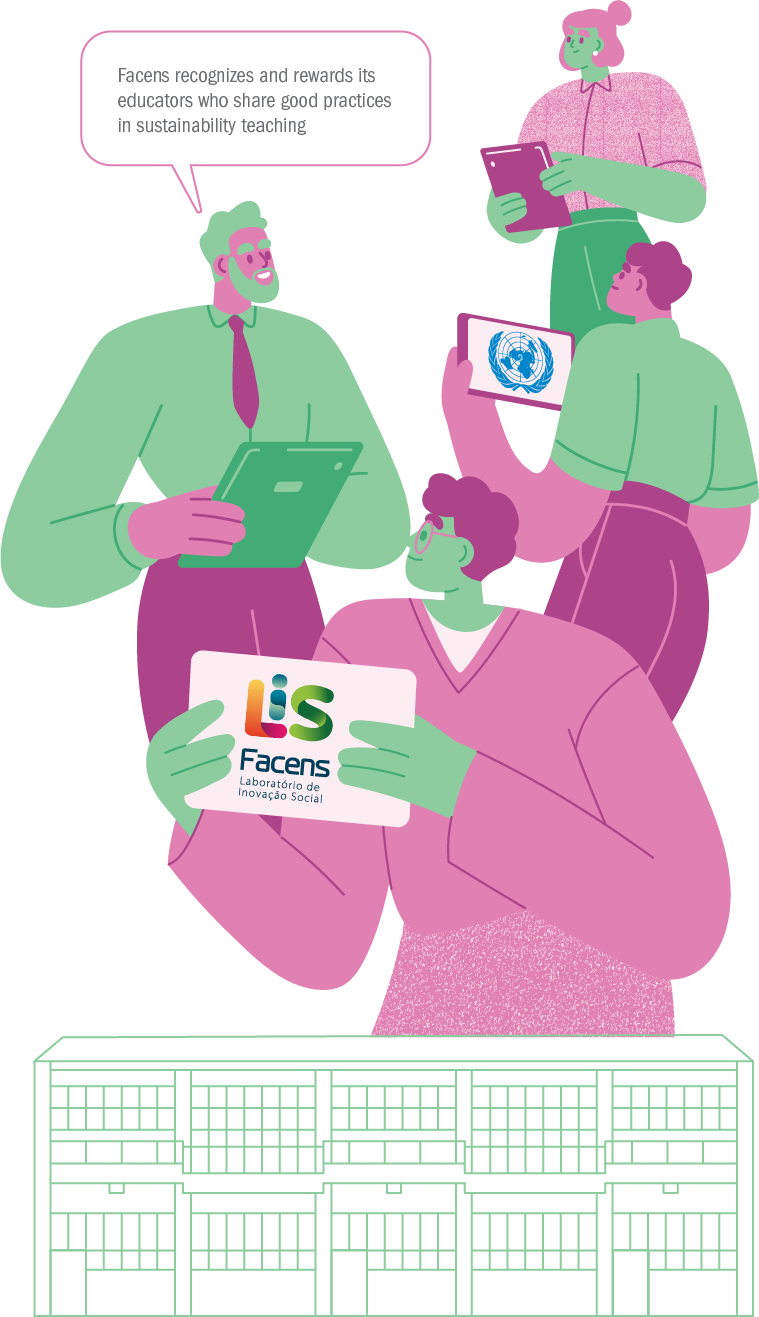
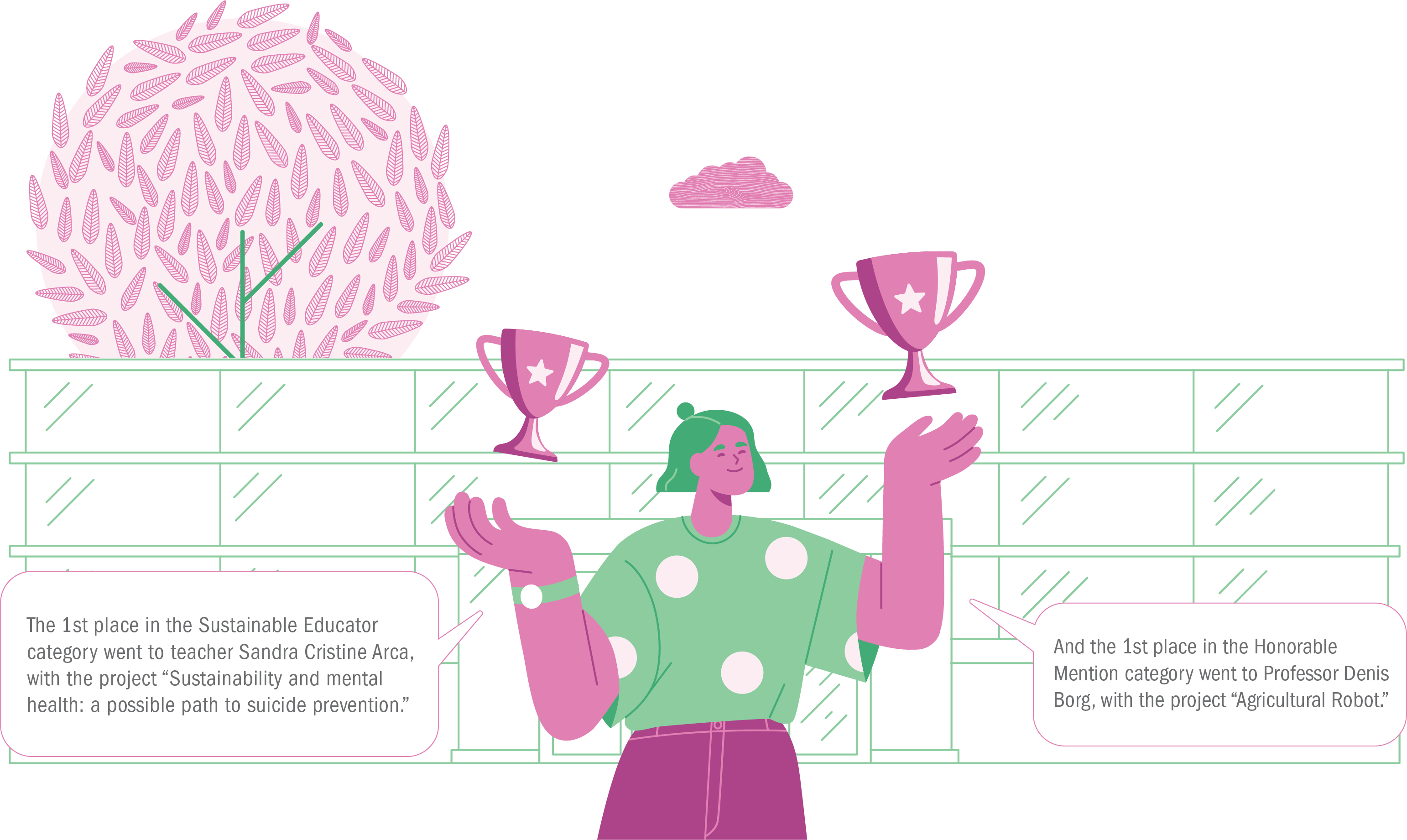
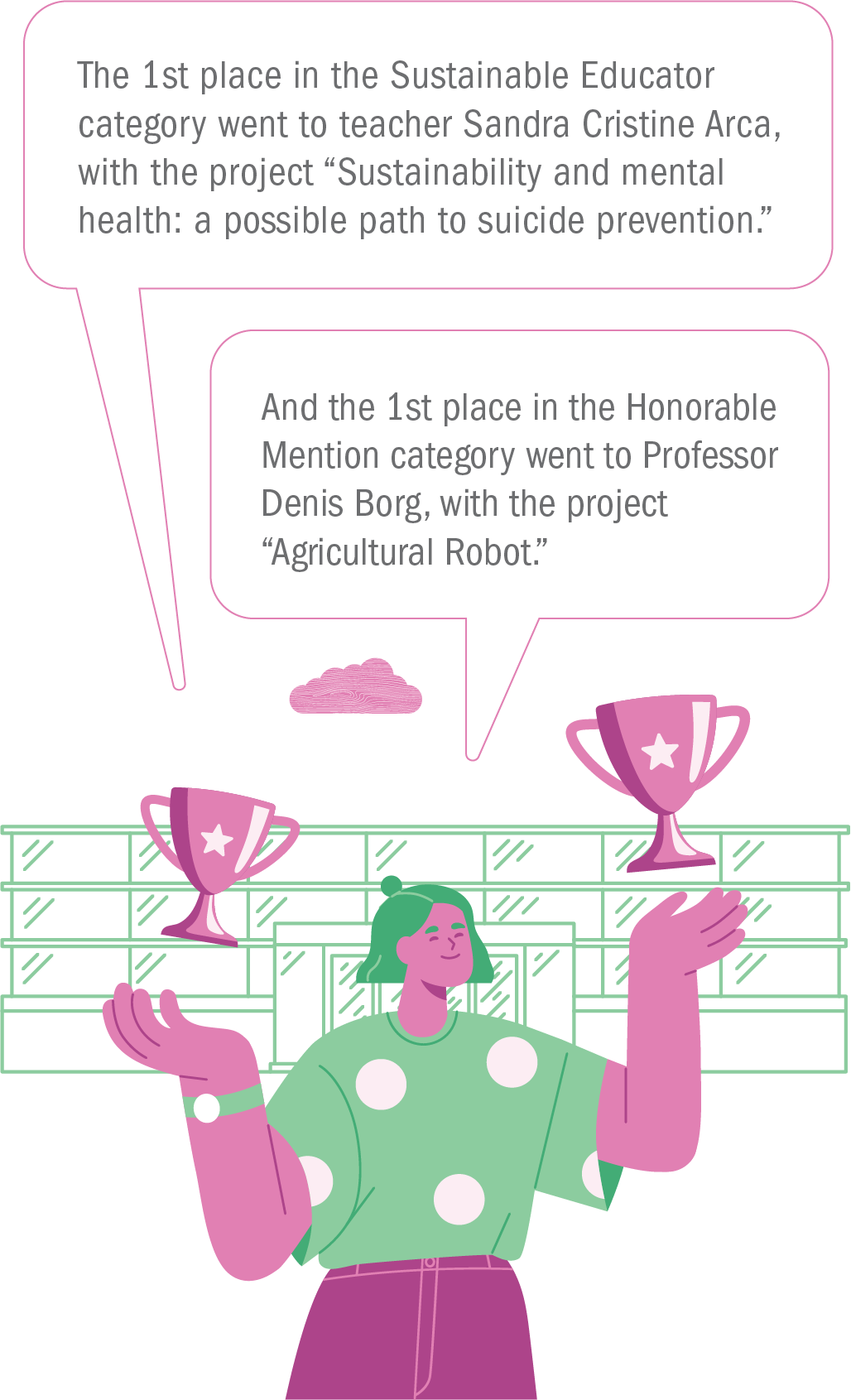
Besides the recognition at the Congregation Meeting,which brought together the Facens University Center faculty, the winners ofeach category received as an award a well-deserved weekend of rest in anecological hotel.

Sustainability in Events
Plugin Facens
In 2022, Facens' major events were divided into four moments throughout the year, focusing on continuous learning: Plugin Innovation; Plugin Competitions; Plugin Careers; and two Plugin Projects that had, in all, more than 7,500 participants.
The Plugin aims to update students, alumni, professionals, and the community at large on the latest innovations and technologies in the areas of Engineering, Architecture, Technology, and Health.
The events sought to promote forums for debates on the main trends in these sectors, through panels, challenges, exhibitions, workshops, dynamics and more, addressing sustainability at various times! Some of the panels were: Sustainable constructions and innovation; The challenges of inclusion and diversity in technology companies; and Evolution and trends in Brazilian agribusiness.
We also had the “women techmakers” Challenge that sought to answer the question: how can we engage and retain women in engineering?
Altogether, there were more than 15 competitions in which participants had the opportunity to practice and demonstrate their technical and socio-emotional skills.
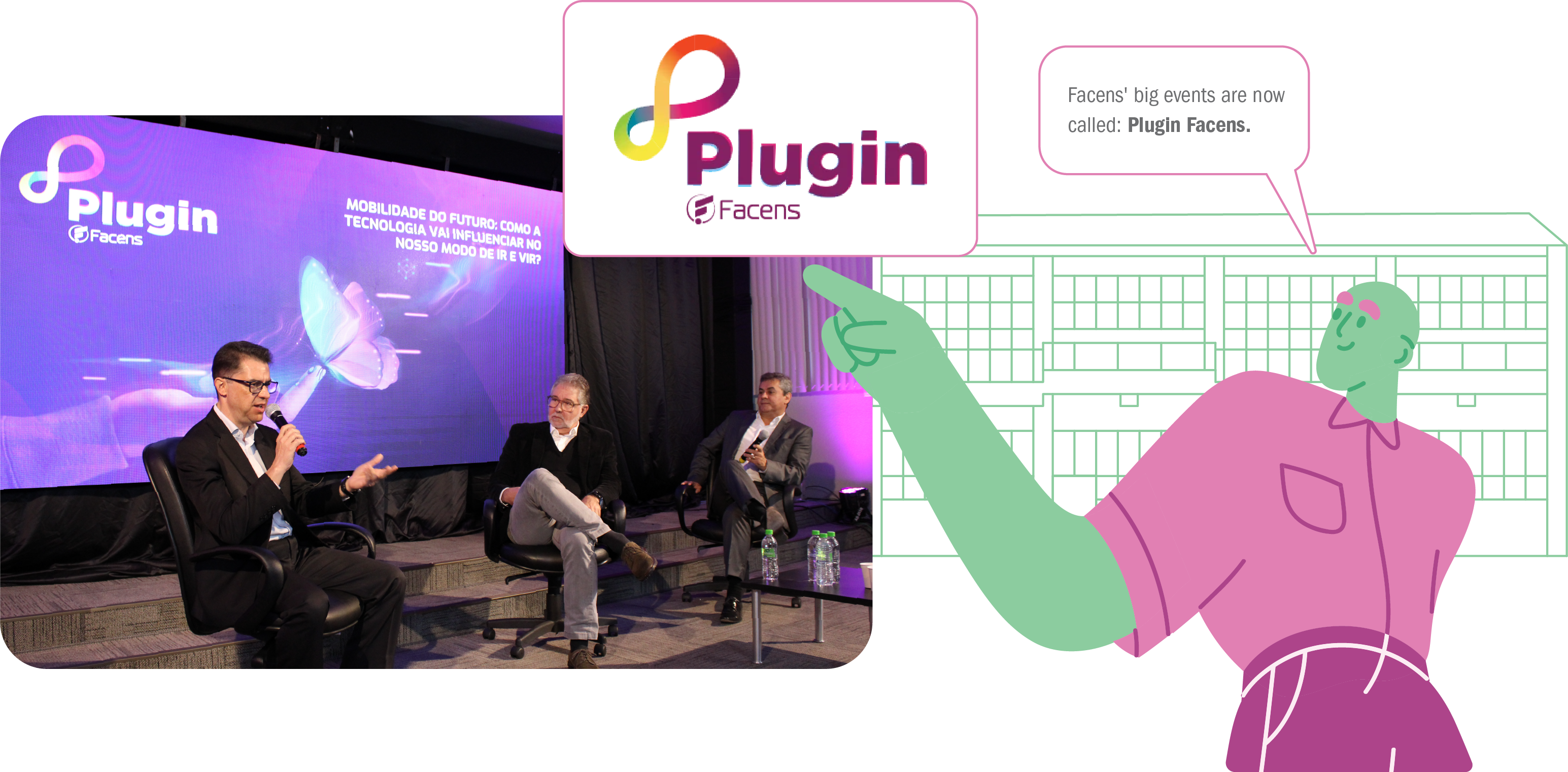
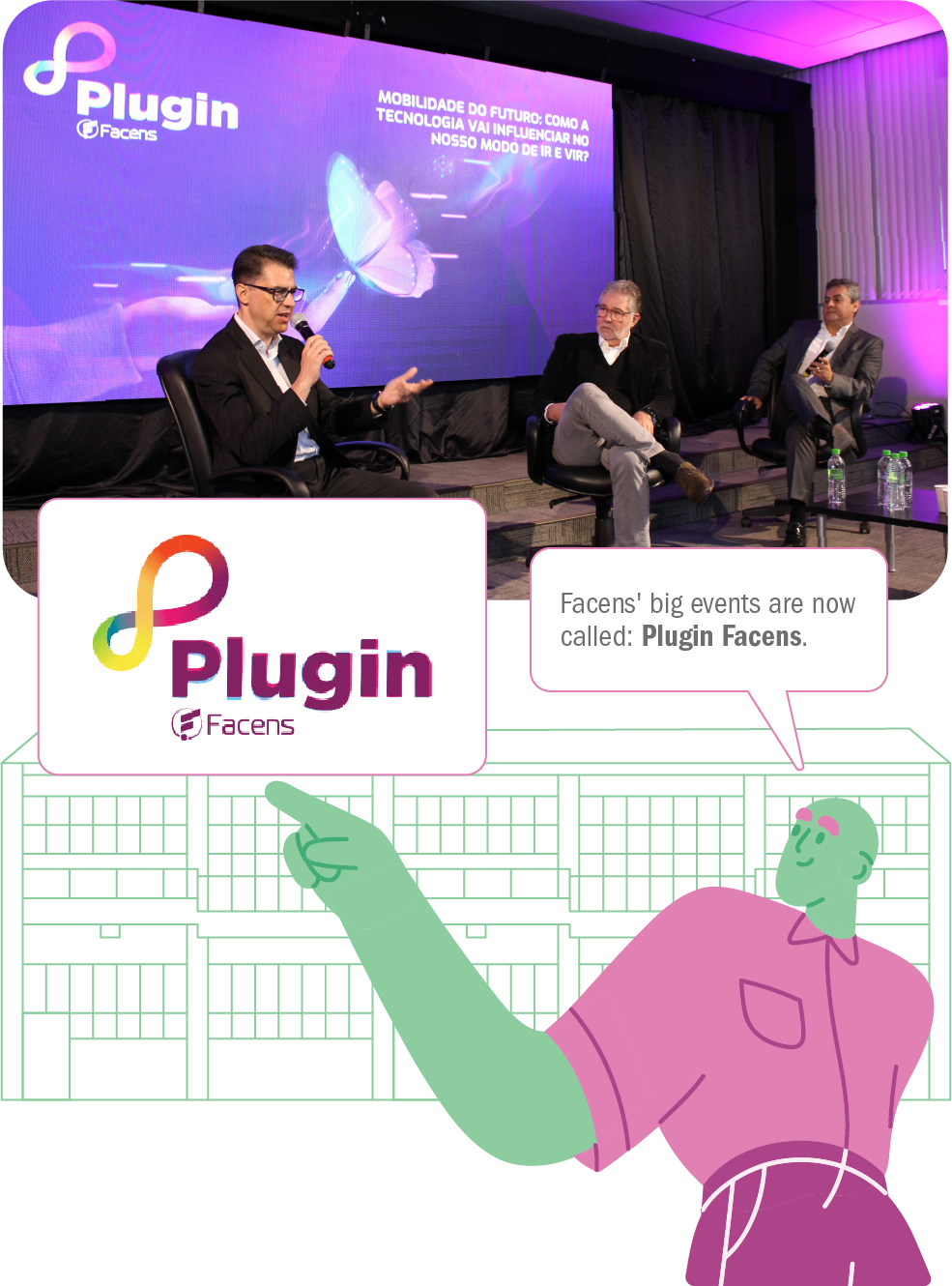
Freshman Week
Created six years ago, Freshman Week has been providing new students of Engineering, Architecture and Urbanism, Technology, and Health courses with an important moment of integration with the entire Facens community. About 600 students participated in an intense dynamic in which they were able to reflect on their professional and personal goals. In 2022, due to social isolation at the beginning of the year, the activities were carried out remotely. In the various activities, the pillars were worked on: Innovation, Entrepreneurship, Sustainability, and Internationalization. Moreover, several concepts about the Sustainable Development Goals (SDGs), and the Metaverse were addressed. This process was also complemented by socio-environmental reflections covering the “me with me, the “me with the other” and the “me with the world”.
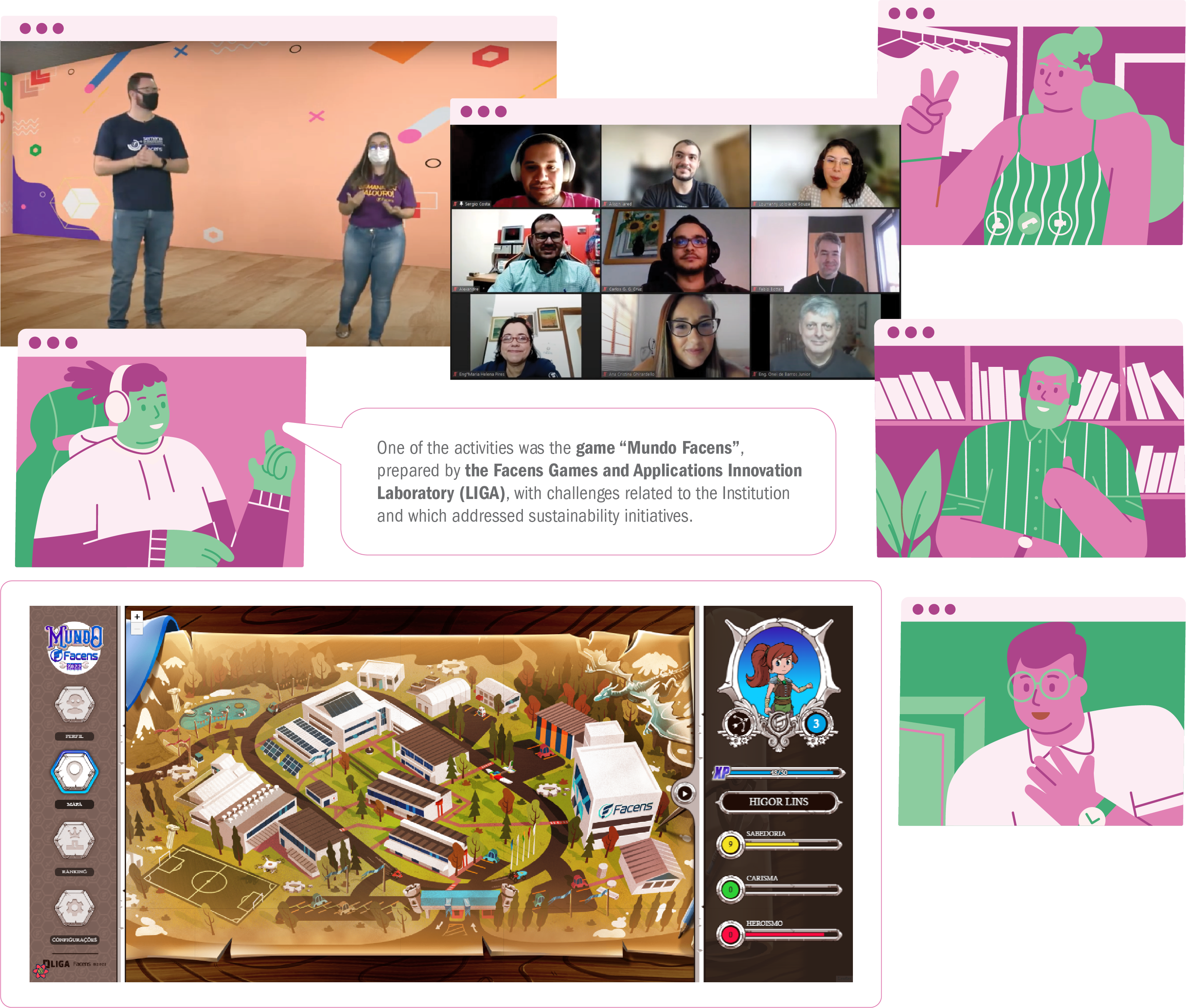
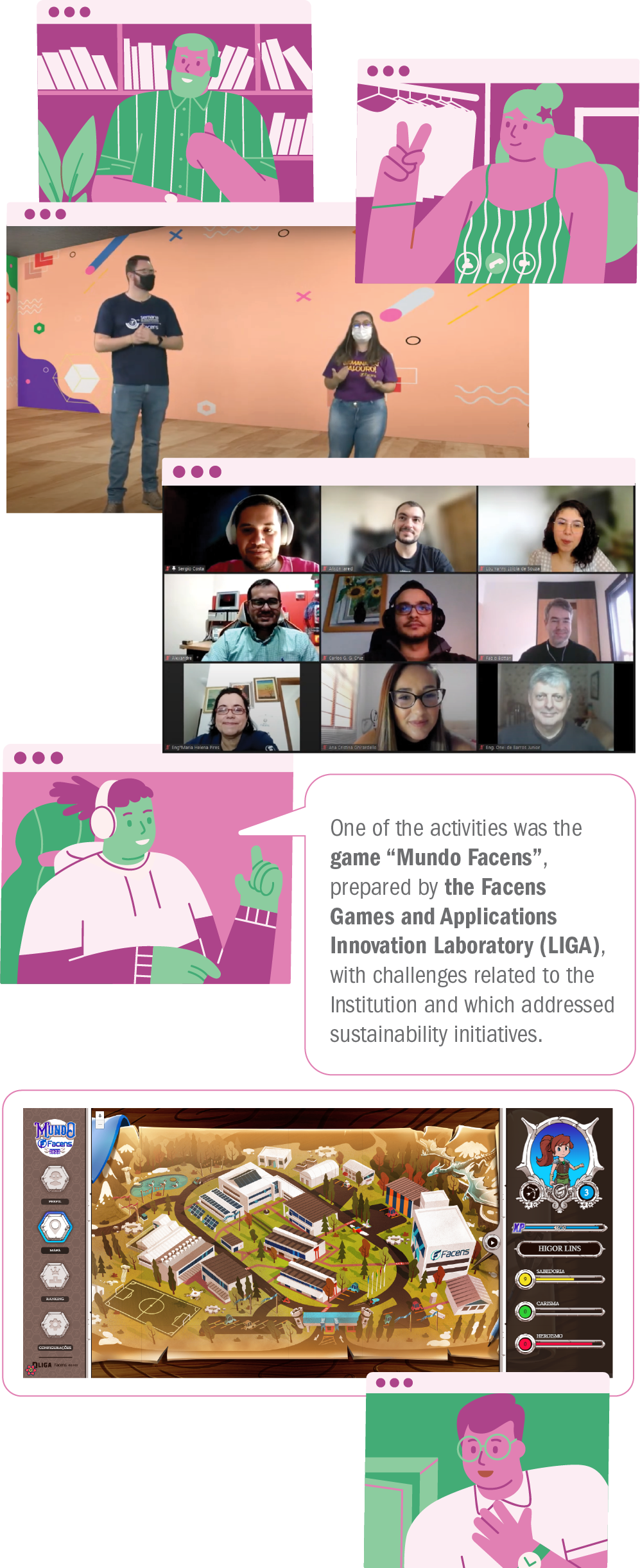
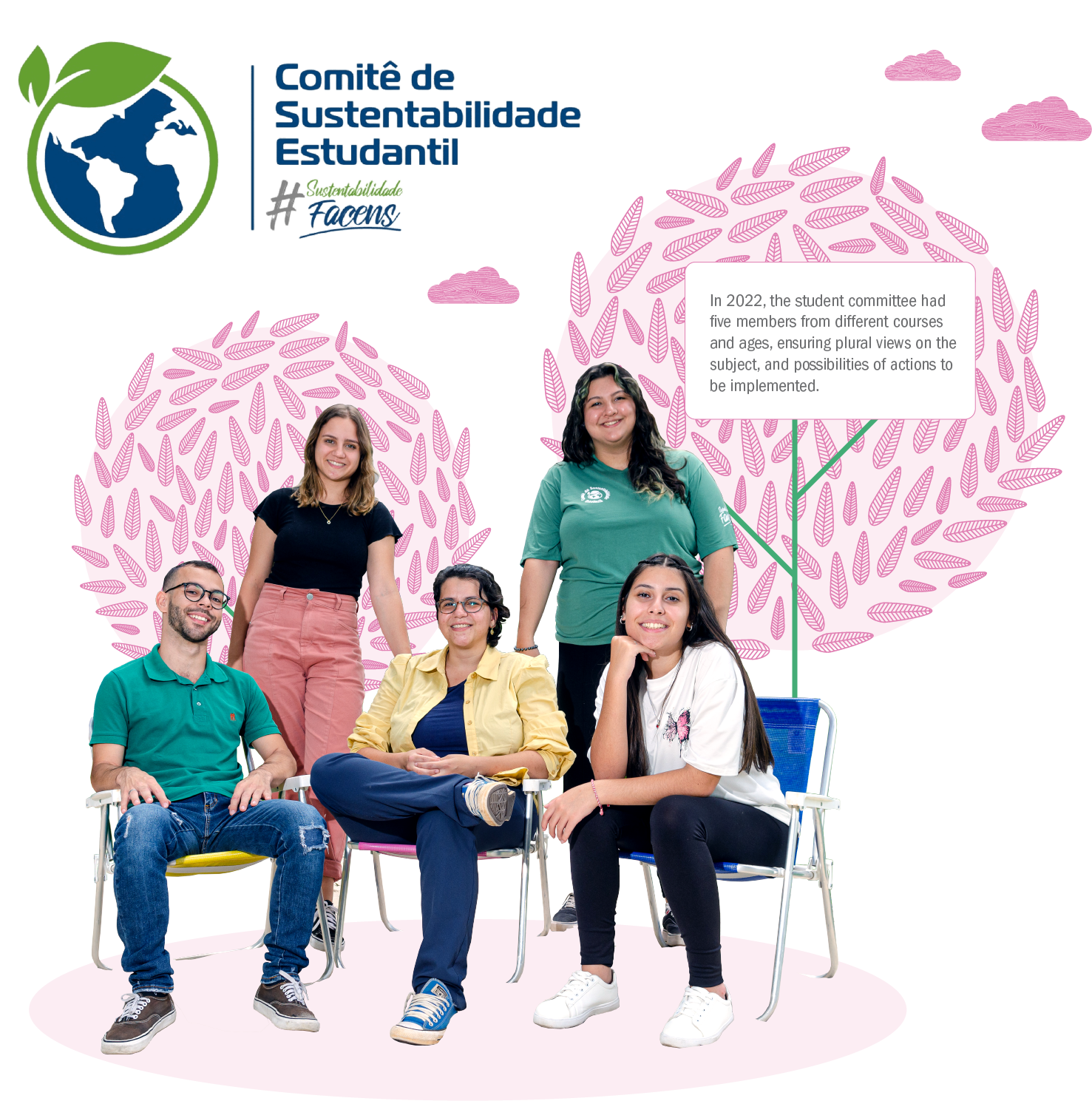

In 2022, the student committee had five members from different courses and ages, ensuring plural views on the subject, and possibilities of actions to be implemented.The student sustainability committee is an organization created in 2021 and is formed by students from the Facens University Center and aims to develop projects related to the Sustainable Development Goals (SDGs) of the UN (United Nations). It is a space for learning and protagonism for its members.
The development of specific projects and activities are guided by members of the Facens University Center's Sustainability Committee and aim to encourage students to learn more about sustainable actions and practice them on a daily basis.
Library
The Facens library features modern and comfortable facilities, providing its users with an environment conducive to studies, research and creation. In the collection space, a variety of accessibility features are also available, including platforms, touch keyboards, voice scanners, screen readers, braille printers, touch floors, tablets, and service counters designed to accommodate wheelchair users or people of reduced stature.
In addition to its pleasant and welcoming environment, the library holds several exhibitions throughout the year that provide encounters with art. These exhibitions not only offer an enriching experience, but also encourage the development of empathy and reflection on the themes presented, stimulating a new perspective through the sensitization of the look.
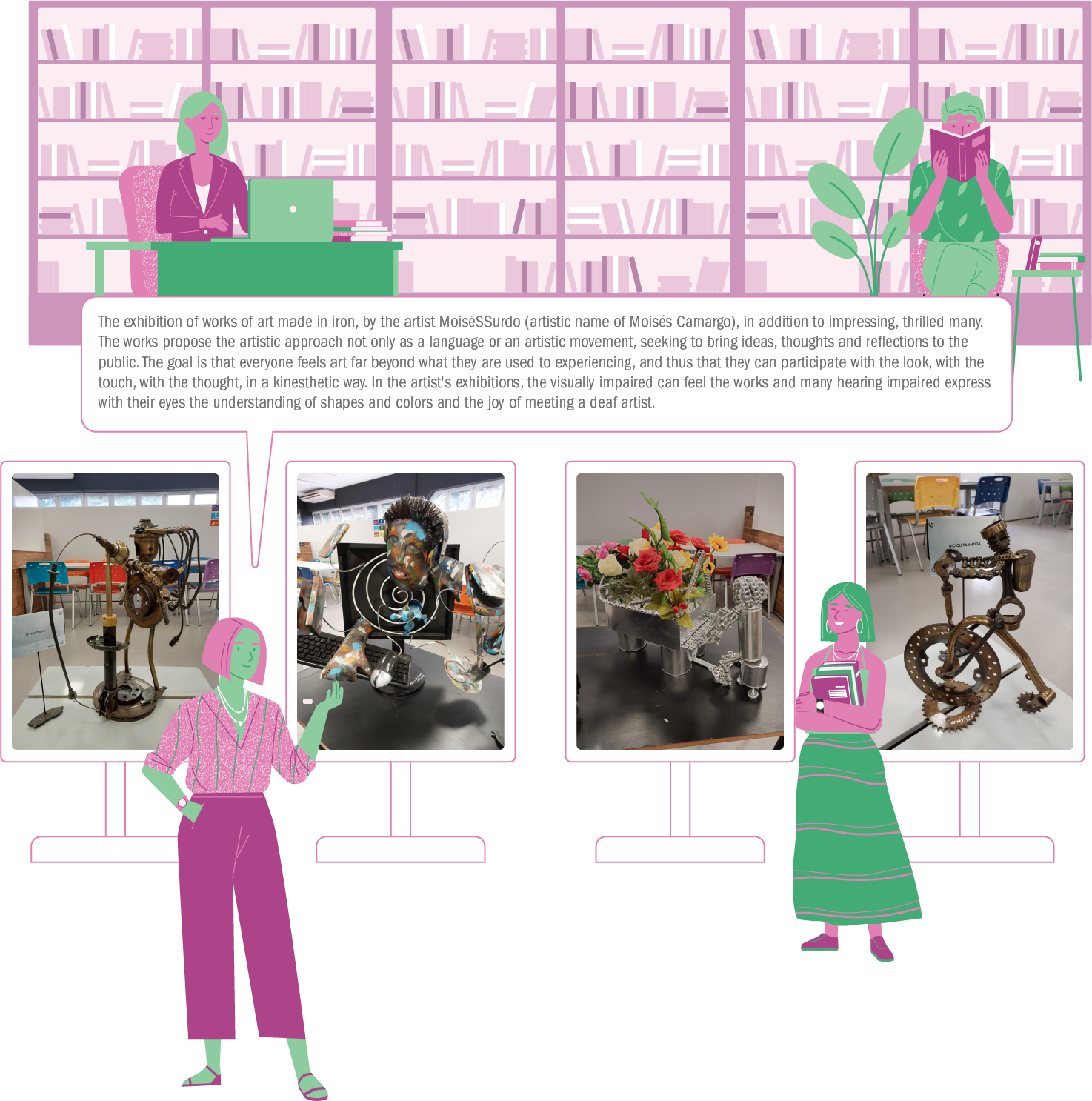
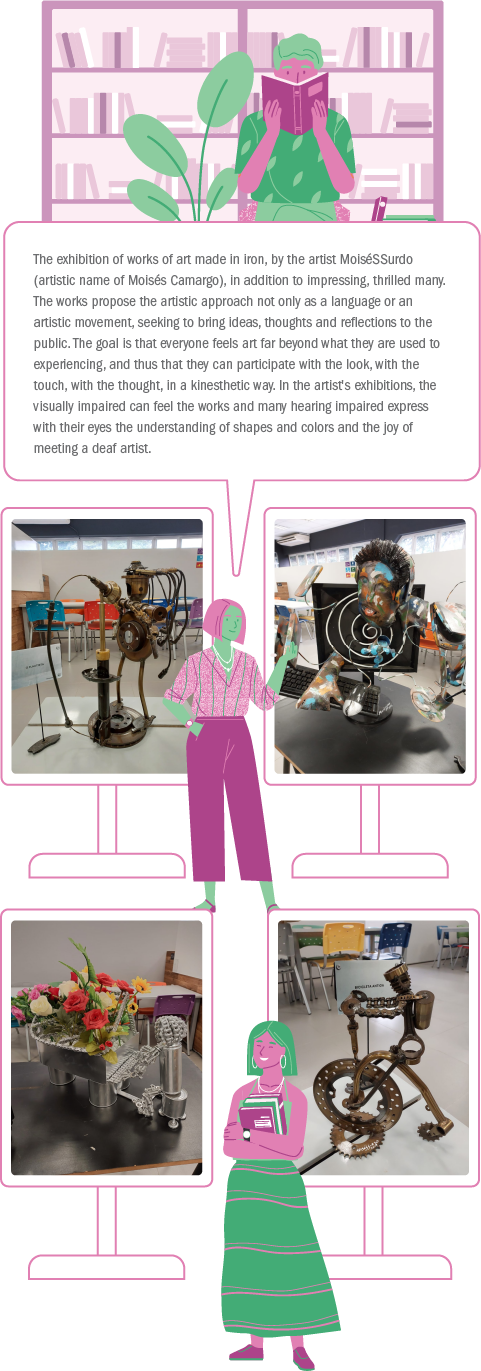
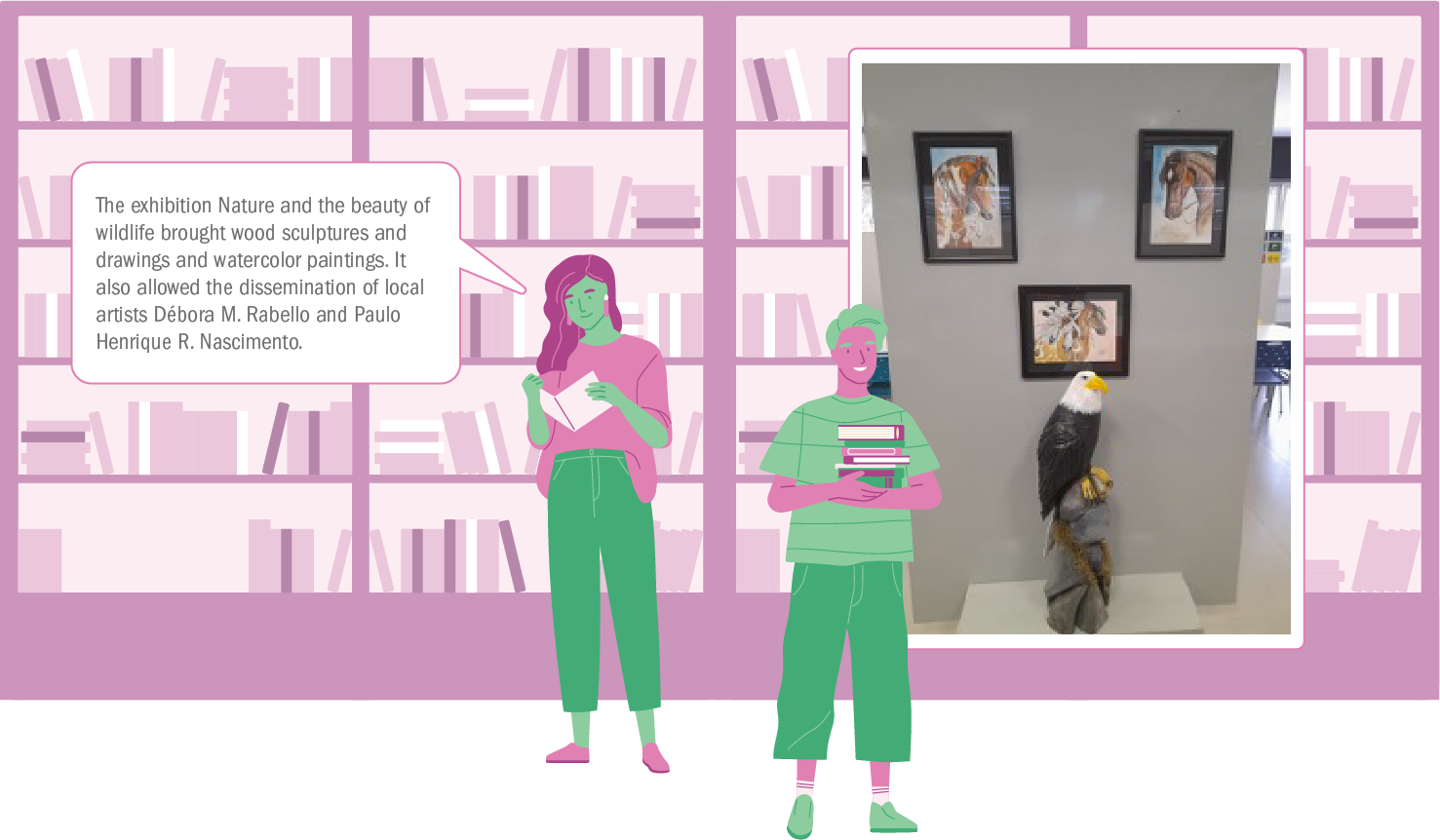
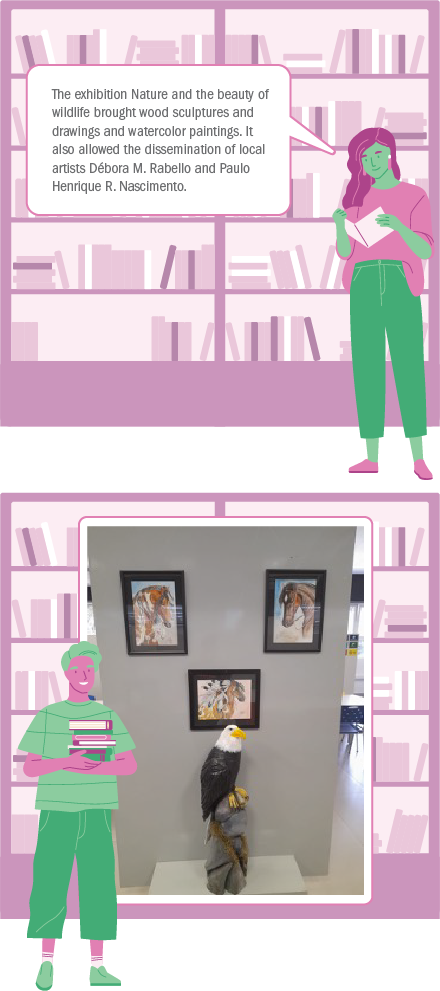
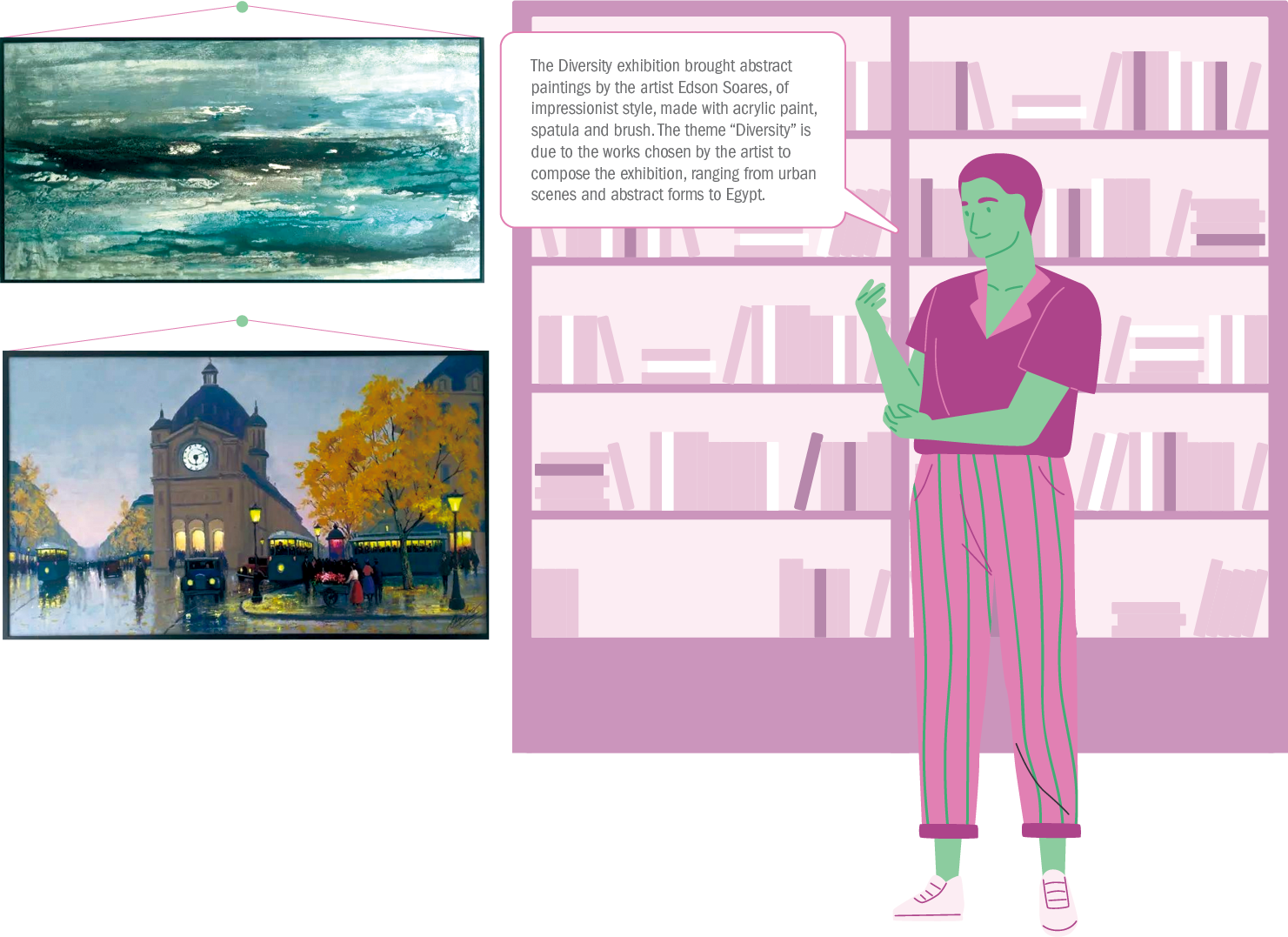
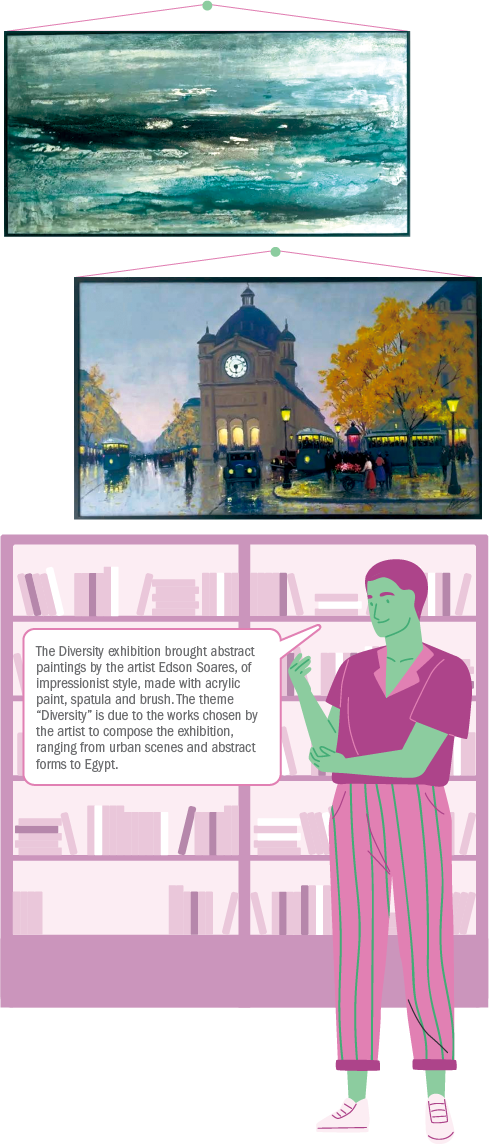
Internationalization
DRI

Created in 2015, the International Relations Office (DRI) works on the internationalization of Facens, with social responsibility and development of programs, projects and partnerships with institutions, and networks around the world:
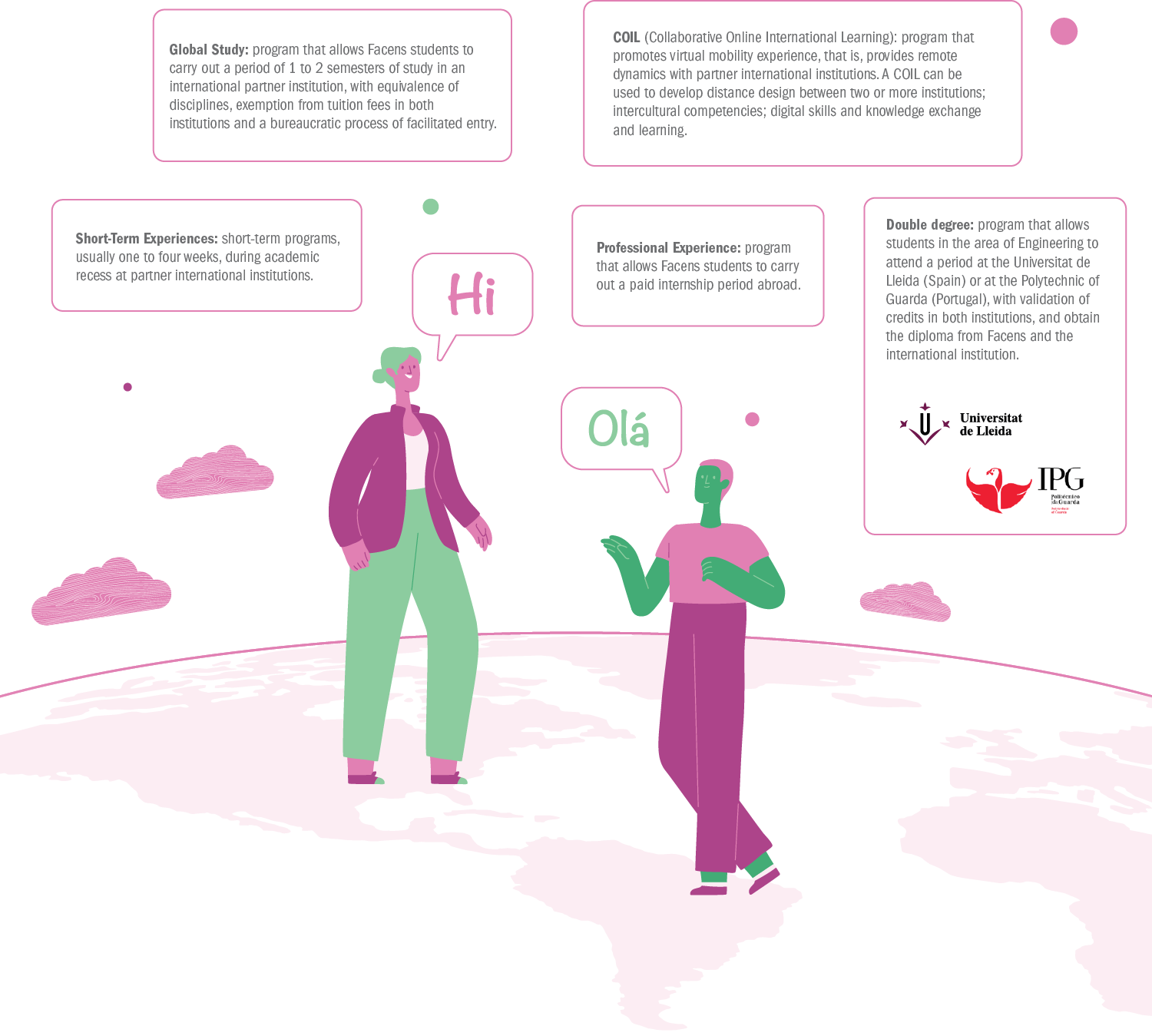
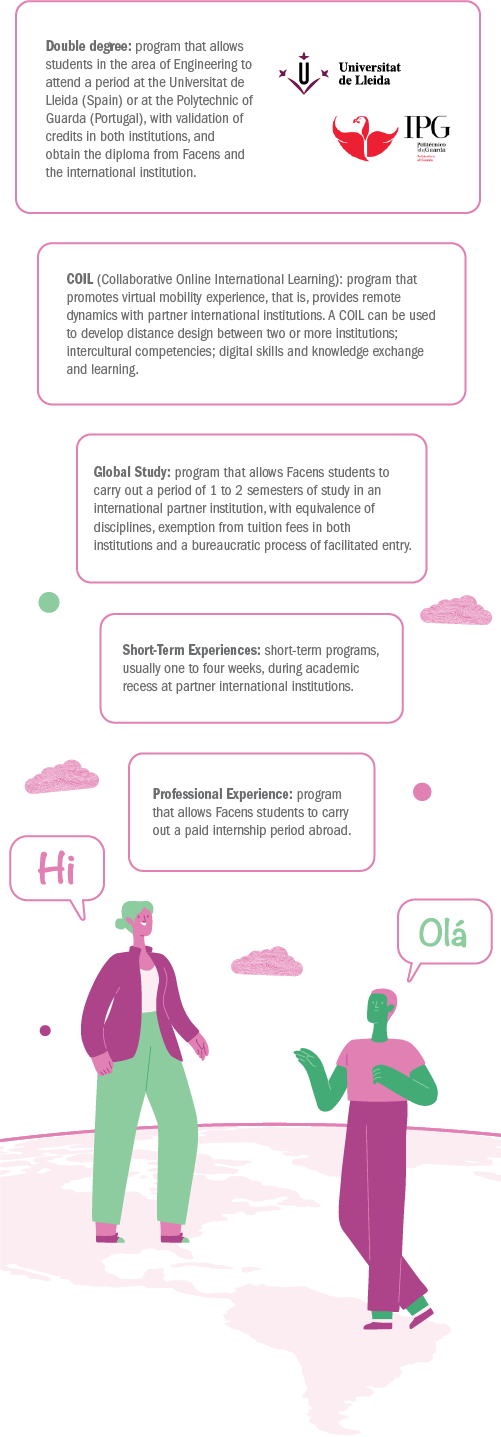
Facens Language Institute
Seeking to provide means for our students to exploreall opportunities for internationalization, we have the Language Institutethat, in partnership with CCBEU (Centro Cultural Brasil Estados Unidos) and theConfucius Institute for Business, FAAP, offers courses in the followinglanguages (in person and online): English, Spanish, German, Japanese, Italian,Mandarin, and Portuguese for foreigners. In addition, we are an official TOEFLiBT exam center.

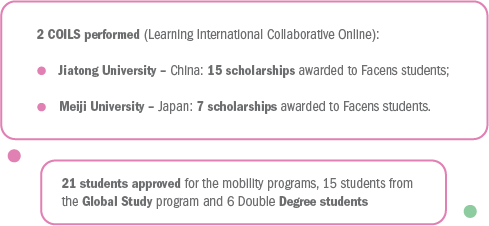
Innovation and Smart Cities Immersion Program offered by Smart Lab, in partnership with IES in Peru
Another internationalization action was the Innovation and Smart Cities course that trained 10 Peruvian professors from the Universidad Nacional de Educación Enrique Guzmán y Valle (UNE EGyV), Facens' partner institution in Peru.
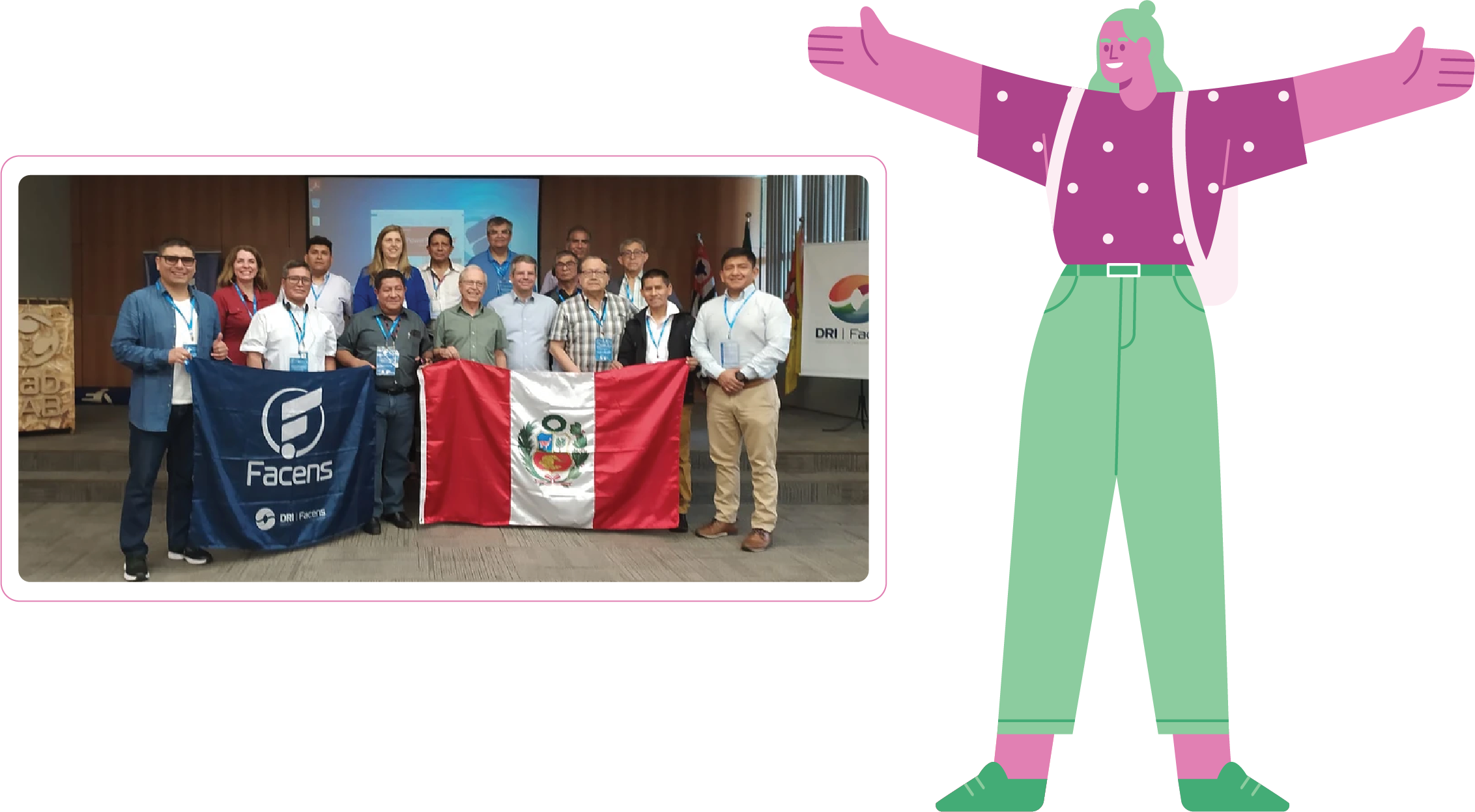
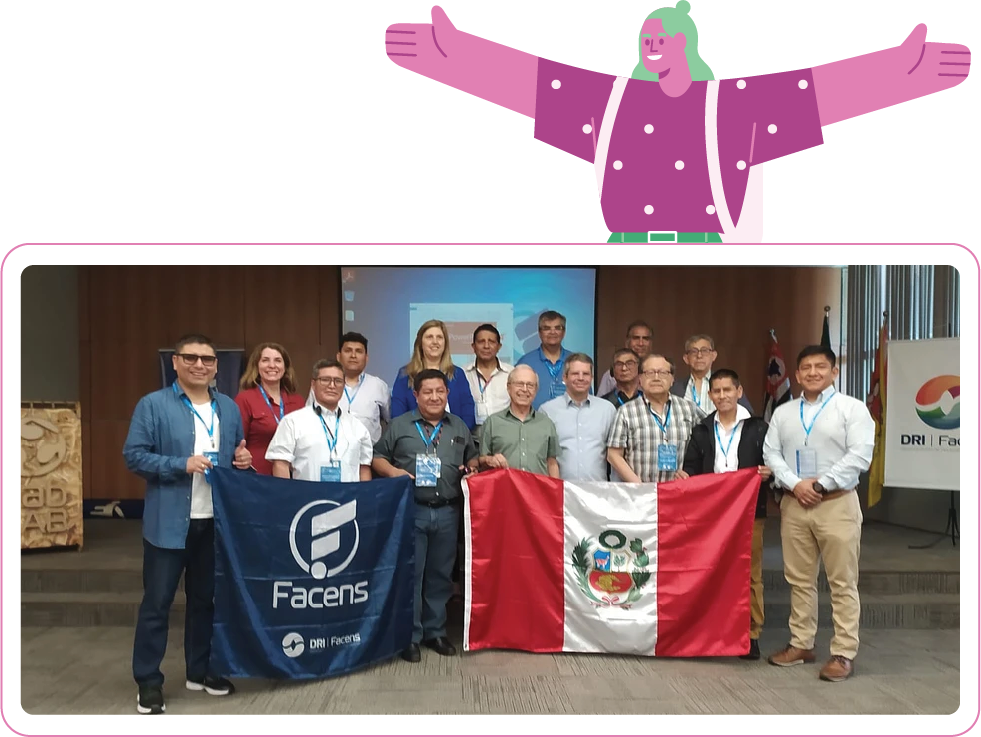
International Scientific Meeting

In 2022, the second edition of the Facens International Scientific Meeting took place. The event was totally free and held 100% in the virtual modality, having addressed general information about the research practice, the writing of scientific articles, the search for relevant and reliable information in the different existing databases, as well as the guidelines and good practices for the use of national and foreign databases and indexes. Themes of ongoing research at Facens were also presented in prominent areas in the contemporary scenario, such as 5G technology; Industry 4.0; artificial intelligence; software-defined networks; nanocapsules; among others.
Class of the international module of the MBA Management and Innovation in Smart Cities course
The MBA Management and Innovation in Smart Cities formed two classes in 2022, totaling seven classes since its creation. Also in 2022, the course provided, for the second time to students, the International Module. This time, 26 students had their international training at the Faculty of Lleida, in addition to participating in the Smart City Expo Barcelona 2022.

